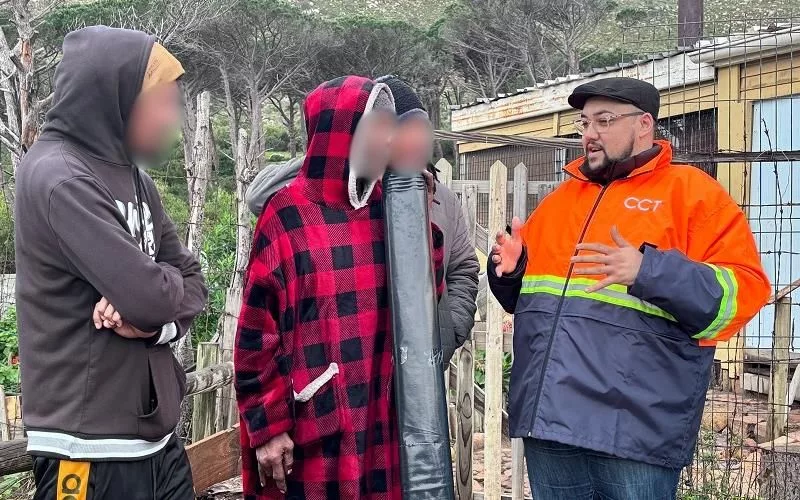The story of Andrew Willem Fleming and the murder of his wife, Karin, in the small town of George, South Africa is a shocking reminder of the devastating consequences of domestic violence and mental instability. The idyllic rural setting masks a story of familial strife, abuse, and mental health concerns. The court case highlighted the need for severe punishment for domestic violence, and the importance of addressing mental health concerns to prevent family disputes from escalating to such horrifying extremes.
The Disconcerting Pastoral Charm of George
The tranquil countryside allure of George masks a grim narrative of familial strife, mental instability, and domestic abuse, leading to an appalling homicide. Andrew Willem Fleming was handed a 27-year prison sentence for the murder of his wife, Karin Fleming. The case highlights the critical importance of addressing mental health concerns and preventing family disputes from spiraling out of control to such horrifying extremes.
The Disconcerting Pastoral Charm of George
The tranquil countryside allure of the small town of George masks a grim narrative, one of familial strife, battles with mental health, and domestic abuse, all of which ultimately culminate in an appalling homicide. This story serves as a sobering testament to the horrifying extent of human capacity for aggression, even towards those nearest and dearest to us.
Turbulent Lives: Andrew Willem Fleming and the Unfortunate Murder
One of the town’s denizens, Andrew Willem Fleming, was recently handed a 27-year prison sentence, decreed by the George Regional Court, for the murder of his wife, Karin Fleming. The life story of this 43-year-old man is entwined with a dreadfully grim narrative of domestic conflict and the lurking presence of mental instability.
Andrew and Karin Fleming spent 14 years together, a marital journey marked more by hardships than happiness, primarily due to the persistent meddling of Karin’s relatives. The influence of the family was so harmful that Andrew had been keeping his mother-in-law, sister-in-law, and niece at arm’s length for four years.
The course of their marital life took a sorrowful detour following a telephonic conversation Karin had with her niece. Andrew had previously warned his wife not to keep in touch with the niece, citing past altercations, yet the familial bond proved resilient. The phone call culminated in a fierce dispute, during which Andrew alleged that he was subjected to insults and belittlement over WhatsApp messages.
From Home to Battleground: The Escalation of Family Conflict
Their abode, which once served as a sanctuary, had morphed into a war zone. Upon returning home to find his wife in a state of distress, shedding tears, Andrew was made painfully aware of the toll the family conflict had taken. Driven to desperation, Karin proposed a radical solution – to leave George and start anew elsewhere.
Tensions heightened further when Karin, ignoring her husband’s apprehensions, went for a brunch with her mother and sister. Upon her return, she confronted her husband about his anger, which ignited a fatal clash.
Fleming confessed to assaulting his wife on their bed, during which a light stand and a knife were knocked over. The knife, in a tragic turn of events, was used to bring about his wife’s untimely end. He acknowledged stabbing her numerous times until she succumbed to her injuries.
Overwhelmed by the sheer terror of his deeds, Fleming cleansed the blood from his hands, dressed himself, and proceeded to the local police station. There, he admitted to his horrific crime, leading the police to the macabre crime scene.
The Court Case: Mental health, Remorse and the Verdict
During the court proceedings, Fleming’s psychological condition, characterized by depression and bipolar disorder, along with a troubled past and a history of substance abuse, were highlighted. His deep remorse and his complete cooperation with law enforcement were small yet significant indications of his humanity, amidst the ghastly evidence of his violent behavior.
The Prosecutor, Johannes Marx, emphasized the necessity of severe punishment for such vile deeds, underlining the need to send a clear societal message of zero tolerance towards domestic violence. Taking into account all these aspects, the court pronounced a 27-year prison term, diverging from the traditional life sentence typically meted out in such cases.
According to Eric Ntabazalila, the spokesperson for the National Prosecuting Authority, Fleming will need to serve a minimum of 18 years of his sentence before he becomes eligible for parole.
The Aftermath: Lessons from the Tragedy
The Fleming case stands as a stark reminder of the high stakes involved in domestic conflicts and the shattering, irreversible consequences of domestic abuse. It highlights the critical importance of addressing mental health concerns and preventing family disputes from spiraling out of control to such horrifying extremes.
What is the story of Andrew Willem Fleming and the murder of his wife?
Andrew Willem Fleming was handed a 27-year prison sentence for the murder of his wife, Karin Fleming. The couple’s marital journey was marked more by hardships than happiness, primarily due to the persistent meddling of Karin’s relatives. The course of their marital life took a sorrowful detour following a telephonic conversation Karin had with her niece, which ultimately culminated in a fierce dispute and a fatal clash.
What does the case highlight?
The case highlights the devastating consequences of domestic violence and mental instability. It emphasizes the need for severe punishment for domestic violence and the importance of addressing mental health concerns to prevent family disputes from escalating to such horrifying extremes.
What is the importance of addressing mental health concerns?
Addressing mental health concerns is critical to preventing family disputes from spiraling out of control to such horrifying extremes. In the case of Andrew Willem Fleming, his psychological condition, characterized by depression and bipolar disorder, along with a troubled past and a history of substance abuse, played a significant role in the tragic turn of events.
What was the court’s verdict?
During the court proceedings, Fleming’s psychological condition, deep remorse, and complete cooperation with law enforcement were taken into account. The prosecutor emphasized the necessity of severe punishment for such vile deeds, and the court pronounced a 27-year prison term, diverging from the traditional life sentence typically meted out in such cases. Fleming will need to serve a minimum of 18 years of his sentence before he becomes eligible for parole.
What is the aftermath of the tragedy?
The Fleming case serves as a sobering reminder of the high stakes involved in domestic conflicts and the shattering, irreversible consequences of domestic abuse. It highlights the need for greater awareness and action to prevent such tragedies from occurring again.
What is the importance of preventing family disputes from escalating?
Preventing family disputes from escalating is critical to avoiding tragedies like the one that occurred in the Fleming case. It is essential to address the underlying issues, such as mental health concerns, and to promote healthy communication and conflict resolution within families.












